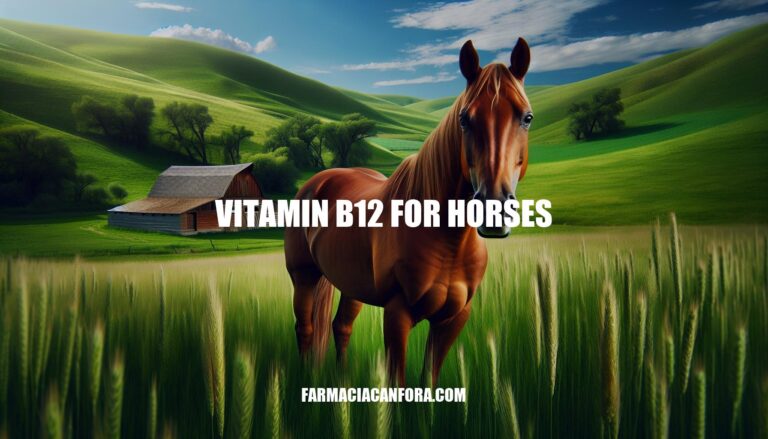Vitamin B12 is essential for horses, playing a crucial role in their overall health and well-being. It supports energy production, red blood cell formation, and nervous system health, ensuring horses maintain optimal stamina, vitality, and metabolic function. Proper Vitamin B12 levels are vital for performance, growth, and overall equine health.
What is Vitamin B12?
Vitamin B12, also known as cobalamin, is a complex, water-soluble vitamin that contains the mineral cobalt. Its chemical formula is
C63H88CoN14O14P
.
Horses obtain Vitamin B12 primarily through their diet and the synthesis by bacteria in their gut. Since plants do not produce Vitamin B12, horses rely on high-quality forage and the microbial activity in their hindgut to meet their needs.
Benefits of Vitamin B12 for Horses
Here are the specific benefits of Vitamin B12 for horses:
- Energy Production: Vitamin B12 is crucial for converting carbohydrates, fats, and proteins into energy, which is essential for performance and stamina.
- Red Blood Cell Formation: It plays a vital role in the production of red blood cells, ensuring efficient oxygen transport to tissues and organs.
- Nervous System Health: Vitamin B12 supports the maintenance of the myelin sheath, which protects nerve fibers and ensures efficient nerve signal transmission.
Signs of Vitamin B12 Deficiency in Horses
Vitamin B12 deficiency in horses can lead to several health issues:
- Anemia: Reduced red blood cell count causing fatigue and weakness.
- Poor Coat Condition: Lack of shine and health in the coat.
- Weight Loss: Unexplained weight loss despite adequate nutrition.
- Lethargy: Decreased energy levels and stamina.
- Neurological Issues: Signs of nerve dysfunction, such as incoordination or unusual behavior.
If you suspect a deficiency, consulting a veterinarian is crucial for proper diagnosis and treatment.
Ensuring Adequate Vitamin B12 Intake
To ensure horses receive sufficient Vitamin B12:
-
Diet:
- High-Quality Forage: Ensure your horse’s diet includes high-quality pasture grasses and hay, which support gut bacteria that synthesize Vitamin B12.
- Balanced Feed: Use a balanced commercial feed that includes necessary vitamins and minerals.
-
Supplementation:
- Specific Needs: For performance horses, pregnant mares, or those with health issues, consider Vitamin B12 supplements. Typical dosage is around 2,000 micrograms (mcg) per day, but always follow your veterinarian’s advice.
- Forms: Supplements can be given orally or via injections, depending on the horse’s condition and veterinarian’s recommendation.
-
Veterinary Consultation:
- Regularly consult with a veterinarian to tailor a nutrition plan specific to your horse’s needs and monitor their health.
By combining a balanced diet with appropriate supplementation and veterinary guidance, you can ensure your horse maintains optimal Vitamin B12 levels.
Vitamin B12: Essential for Horses’ Health
Vitamin B12 is essential for horses, supporting energy production, red blood cell formation, and nervous system health. Horses obtain it through their diet and gut bacteria synthesis.
A deficiency can lead to anemia, poor coat condition, weight loss, lethargy, and neurological issues.
To ensure sufficient Vitamin B12, provide high-quality forage, balanced feed, and consider supplements (2,000 mcg/day) under veterinary guidance. Regular consultations with a veterinarian are crucial for monitoring health and tailoring nutrition plans.


